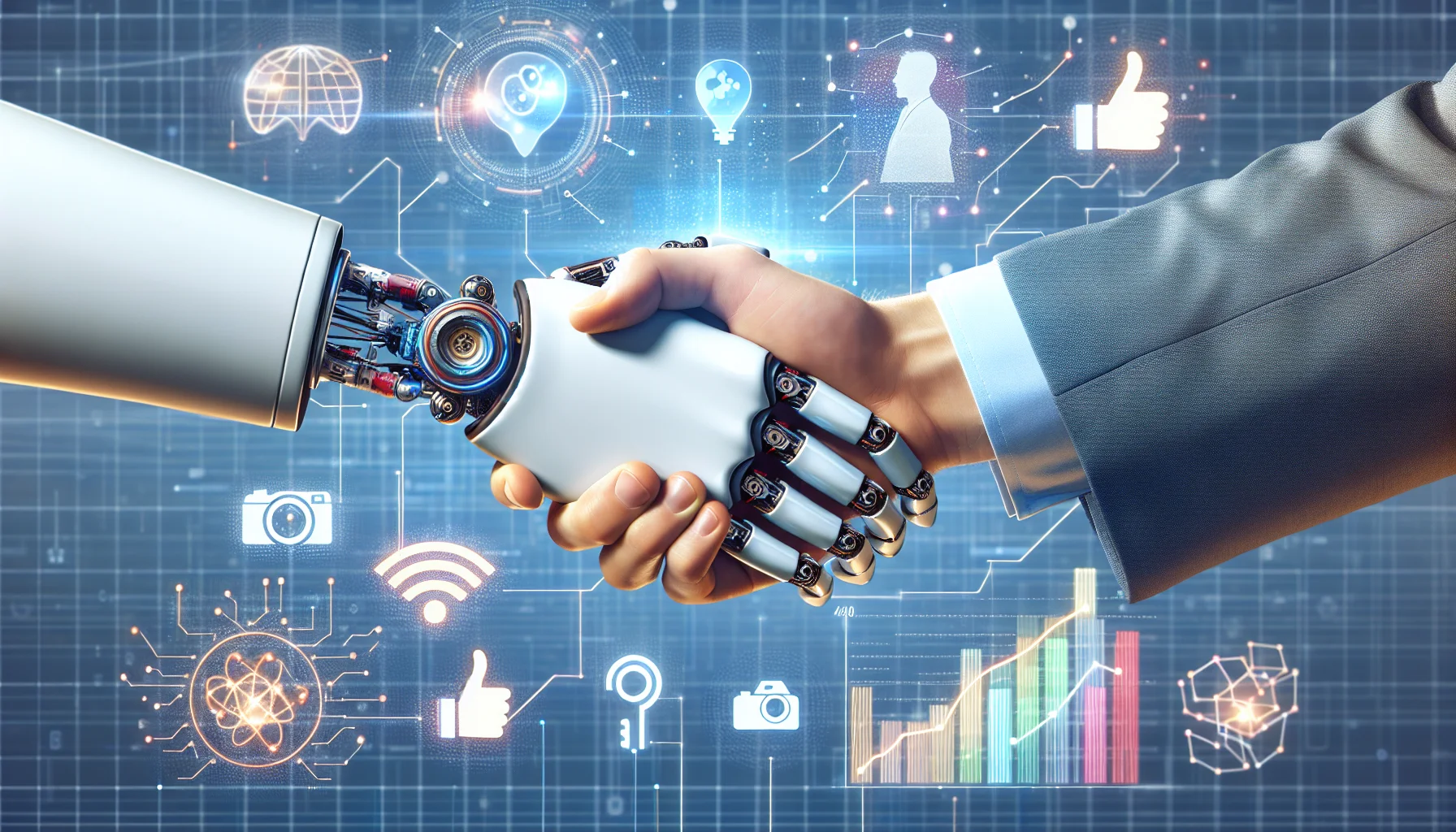This comprehensive guide will investigate into crucial strategies for leveraging AI technology in your marketing automation efforts to propel your business forward. AI has proven to be a game-changer in the marketing world, offering unmatched efficiency and personalized experiences for customers. In this post, you will discover expert tips on harnessing the power of AI in marketing automation to drive business growth.
Key Takeaways:
- Personalization is key: Utilize AI in marketing automation to personalize customer experiences based on their behaviors, preferences, and past interactions.
- Implement predictive analytics: Use AI tools to predict customer behavior and tailor your marketing strategies accordingly for better targeting and conversions.
- Optimize email marketing: AI can help in optimizing email marketing campaigns by analyzing data, segmenting audiences, and sending personalized messages at the right time.
- Enhance customer support: AI-powered chatbots can improve customer support by providing instant responses, handling inquiries efficiently, and increasing customer satisfaction.
- Track and measure performance: Use AI to track and measure the performance of your marketing campaigns, analyze results, and make data-driven decisions to continuously improve your strategies.

Getting Started with AI in Marketing Automation
You’ve decided to take the plunge into leveraging AI in your marketing automation strategies. This move can revolutionize how you engage with customers, streamline your processes, and drive better results. However, getting started with AI in marketing automation can be daunting if you’re new to the technology. Here are some steps to help you kick off your AI-powered marketing journey:
How To Assess Your Business Needs
- Determine your marketing objectives and KPIs
- Evaluate your current marketing automation tools and processes
- Identify areas where AI can optimize your workflows
Automation plays a pivotal role in modern marketing strategies, with AI adding a layer of intelligence to automate and optimize various marketing tasks. Before exploring into AI implementation, it’s crucial to assess your business needs. This involves understanding your current marketing objectives, key performance indicators (KPIs), and the areas in your marketing processes where AI can make a significant impact.
Tips for Selecting the Right AI-Enabled Marketing Tools
- Consider your budget and scalability
- Look for tools that integrate seamlessly with your existing systems
- Ensure the tool provides valuable analytics and insights
AI-enabled marketing tools are designed to streamline processes, enhance personalization, and drive efficiency in your marketing campaigns. When identifying the right AI-enabled marketing tools for your business, it’s vital to consider factors such as budget, scalability, integration capabilities, and the level of analytics and insights the tool can provide. Choosing the right tools can have a significant impact on the success of your AI-powered marketing initiatives.
Additional Information on Selecting the Right AI-Enabled Marketing Tools
- What are the key features to look for in AI-enabled marketing tools?
- How can AI tools enhance lead generation and conversion rates?
With AI-enabled tools, you can supercharge your marketing efforts by automating repetitive tasks, personalizing customer interactions, and predicting future trends. These tools can help you leverage data more effectively, improve campaign targeting, and enhance overall customer experience. Recognizing the right AI-enabled marketing tools can give you a competitive edge and drive business growth in today’s digital landscape.
Enhancing Customer Personalization with AI
All businesses are striving to enhance customer personalization to improve engagement and loyalty. Leveraging AI in marketing automation can significantly boost these efforts by analyzing customer data, predicting behaviors, and delivering tailored messaging and experiences. To effectively utilize AI for personalization, consider the following chatGPT prompt samples:
- "How can AI help personalize customer experiences?"
- "What are the benefits of using AI for customer segmentation?"
- "Give examples of AI-powered personalization in marketing."How-To Guide for Personalized Content Creation
An crucial aspect of enhancing customer personalization is through the creation of tailored content. AI tools can analyze customer preferences, behaviors, and past interactions to generate personalized content at scale. To effectively create personalized content using AI, consider the following chatGPT prompt samples:
- "Tips for using AI to create personalized content"
- "How can AI enhance content personalization strategies?"Factors for Effective AI-Driven Customer Segmentation
Customer segmentation is crucial for personalized marketing strategies. AI-driven segmentation allows businesses to categorize customers based on behavior, demographics, and preferences for targeted campaigns. To achieve effective AI-driven customer segmentation, consider the following chatGPT prompt samples:
- "Importance of AI in customer segmentation"
- "How to optimize AI algorithms for customer segmentation"
- "Benefits of AI-driven customer segmentation."Enhancing customer personalization through AI-driven strategies is key to improving customer satisfaction and increasing conversion rates. By employing advanced algorithms and machine learning models, businesses can create highly targeted and personalized experiences for their customers. These AI tools can analyze vast amounts of data to identify patterns, predict future behavior, and deliver the right message to the right customer at the right time. After all, personalized marketing has the potential to drive customer engagement and loyalty like never before.
Optimizing Campaigns Through Predictive Analytics
For businesses looking to enhance their marketing efforts, predictive analytics can be a game-changer. By harnessing the power of data and AI, companies can optimize campaigns, improve customer targeting, and drive better results. Let’s probe into how predictive analytics can revolutionize marketing campaigns.
How To Implement Predictive Analytics in Campaigns
Implementing predictive analytics in your marketing campaigns can be a daunting task, but the rewards are worth it. By leveraging advanced algorithms and machine learning models, businesses can gain valuable insights into consumer behavior and preferences. This data can then be used to tailor campaigns, predict future trends, and maximize marketing ROI.
- How can predictive analytics help optimize marketing campaigns?
- What are the best practices for implementing predictive analytics in marketing?
- How do machine learning models improve campaign performance?Tips for Analyzing and Forecasting Customer Behavior
Predictive analytics can also help you analyze and forecast customer behavior, allowing you to anticipate their needs and tailor your marketing strategies accordingly. By analyzing historical data and identifying patterns, businesses can predict customer actions, such as purchases, churn, and engagement. This insight enables companies to personalize interactions, enhance customer experience, and drive loyalty.
- How can predictive analytics be used to forecast customer behavior?
- What role does data analysis play in understanding customer preferences?
- How do predictive models help businesses anticipate customer needs?- Personalization: Tailoring campaigns based on customer behavior and preferences.
- Data Analysis: Analyzing historical data to identify trends and patterns in customer behavior.
- Loyalty: Building customer loyalty through personalized interactions and improved customer experience.
- Perceiving customer needs and preferences is key to creating successful marketing campaigns.
The implementation of predictive analytics in marketing campaigns empowers businesses to gain valuable insights into customer behavior, optimize targeting strategies, and enhance campaign performance. By leveraging machine learning models and advanced algorithms, companies can forecast trends, personalize interactions, and drive better results. This strategic approach increases customer satisfaction, improves retention rates, and boosts overall marketing efforts.
Streamlining Customer Interactions with AI Chatbots
To streamline customer interactions with AI chatbots, businesses can leverage the power of artificial intelligence to enhance customer service efficiency and effectiveness. By implementing AI chatbots, companies can provide instant responses to customer queries, offer personalized recommendations, and handle routine tasks, freeing up human agents to focus on more complex issues.
- How can AI chatbots improve customer satisfaction?
- What are the benefits of using AI chatbots for customer interactions?
- In what ways can businesses integrate AI chatbots into their customer service workflows?
Factors to Consider When Deploying Chatbots
When deploying chatbots, businesses should consider factors such as the complexity of customer inquiries, the level of customization required, integration with existing systems, and the need for human oversight. It’s crucial to choose a chatbot platform that aligns with the company’s branding, voice, and tone to ensure a seamless customer experience.
- What are the key factors to consider when implementing chatbots?
- How can businesses ensure chatbots align with their brand identity?
- What measures should be taken to maintain quality control over chatbot interactions?
Even with the advancements in AI technology, businesses must carefully evaluate the readiness of their customer service team to collaborate effectively with AI chatbots. Training employees on how to work alongside AI tools and providing ongoing support is imperative for successful integration and improved customer satisfaction. Perceiving the symbiotic relationship between human agents and AI chatbots can lead to a more efficient and customer-centric approach in handling inquiries.
How-To Integrate AI Chatbots into Customer Service Strategies
Integrating AI chatbots into customer service strategies involves analyzing customer interactions, identifying common pain points, and developing chatbot scripts to address these issues effectively. Businesses should also ensure seamless integration between chatbots and other customer service channels to provide a unified and consistent experience across all touchpoints.
- How can businesses leverage AI chatbots to enhance customer service strategies?
- What steps should businesses take to integrate chatbots into their existing customer service workflows?
- How can AI chatbots help businesses scale their customer support operations?
To successfully integrate AI chatbots into customer service strategies, businesses must prioritize customer data privacy, security, and compliance with regulations. Additionally, regularly monitoring the performance of chatbots through analytics and feedback loops can help identify areas for improvement and ensure the bots continue to meet customer expectations. Plus, having a well-defined escalation process for transferring complex queries from chatbots to human agents is crucial to maintaining customer trust and satisfaction. By carefully considering these factors and implementing best practices, businesses can optimize their customer service operations and drive business growth with AI-powered chatbots.
Improving Marketing ROI with AI-Driven Insights
After implementing AI in your marketing automation strategy, one of the most significant benefits comes from improving your marketing ROI through AI-driven insights. AI tools can analyze large sets of data to provide valuable information on consumer behavior, trends, and patterns that can help optimize your marketing campaigns effectively.
- Predict customer behavior based on past interactions.
- Personalize content to increase engagement.
- Identify high-value leads for targeted campaigns.
- Optimize marketing channels based on performance data.
Using AI To Track and Measure Campaign Effectiveness
There’s a growing trend in using AI to track and measure the effectiveness of marketing campaigns. AI analytics tools can provide real-time insights into campaign performance, allowing marketers to make data-driven decisions quickly. By analyzing metrics such as click-through rates, conversions, and engagement levels, AI can offer valuable feedback on campaign effectiveness and help marketers adjust their strategies for better results.
- Generate predictive models to forecast campaign success.
- Analyze customer sentiment towards marketing campaigns.
- Provide recommendations for improving campaign performance.
How-to Optimize Your Marketing Spend with AI
There’s no denying the impact AI can have on optimizing your marketing spend. By leveraging AI algorithms, businesses can allocate their budget more efficiently by identifying which marketing channels and strategies yield the highest returns. AI can provide insights into which campaigns are performing well and help businesses focus their resources on the most effective tactics to maximize ROI.
- Forecast the impact of budget changes on marketing performance.
- Determine the optimal allocation of resources across different channels.
Using AI to optimize your marketing spend allows you to make strategic decisions based on data-driven insights. By understanding the strengths and weaknesses of your campaigns, you can refine your strategies to maximize your marketing ROI effectively.
- Analyze customer lifetime value to guide marketing investments.
- Identify trends and patterns in customer behavior to tailor marketing campaigns.
Insights: By harnessing AI-driven insights in your marketing automation efforts, you can gain a competitive edge in the market. These insights empower you to make informed decisions, optimize your marketing spend, and ultimately drive growth for your business. By utilizing AI to track and measure campaign effectiveness, as well as optimizing your marketing spend, you can unlock new opportunities for success in the digital landscape.
Scaling Business Growth with AI-Enhanced Lead Generation
Keep your lead generation efforts at the forefront of your marketing strategy by leveraging the power of AI. AI technology can revolutionize how businesses generate leads, helping to identify and target potential customers more effectively. By using AI in lead generation, businesses can streamline the process, improve targeting accuracy, and ultimately drive more conversions. Here are some chatGPT prompt samples related to this subsection:
- How can AI improve lead generation for businesses?
- Tips for using AI to enhance lead generation strategies
- The impact of AI on scaling lead generation effortsTips for Utilizing AI in Lead Scoring and Qualification
Enhance your lead scoring and qualification processes by utilizing AI technology. AI can help businesses analyze large volumes of data to identify the most promising leads, prioritize them, and personalize outreach efforts. By leveraging AI for lead scoring, businesses can increase efficiency, improve sales team productivity, and ultimately boost conversions. Here are some chatGPT prompt samples related to this subsection:
- Best practices for implementing AI in lead scoring
- How AI can automate lead qualification processes
- Optimizing lead scoring with artificial intelligenceThere’s a growing need for businesses to effectively nurture leads to drive conversions and maximize revenue. By harnessing the power of AI automation in lead nurturing, companies can create personalized experiences for prospects, deliver targeted content, and increase engagement. AI can automate repetitive tasks, analyze customer behavior, and provide valuable insights to guide lead nurturing strategies. Perceiving the signals of potential buying behavior early on enables businesses to tailor their approach and increase the likelihood of conversion.
How To Nurture Leads Effectively with AI Automation
Any business looking to succeed in lead nurturing can benefit from incorporating AI automation into their strategies. AI can help track customer interactions, segment leads based on behavior, and deliver timely, relevant content to move leads through the sales funnel. With AI-powered lead nurturing, businesses can build stronger relationships with prospects, nurture them at scale, and ultimately drive more conversions. Here are some chatGPT prompt samples related to this subsection:
- Benefits of using AI for lead nurturing
- Best practices for implementing AI in lead nurturing workflows
- Leveraging AI to personalize lead nurturing campaignsAutomation in lead nurturing can significantly impact a business’s bottom line. By leveraging AI technology, companies can streamline their lead nurturing process, providing personalized interactions and relevant content to prospects. This level of personalization can increase engagement, build trust, and ultimately drive conversions. However, businesses should be cautious of over-automation, as it can lead to a lack of human touch and alienate potential customers. Ensuring the right balance between automation and personalization is crucial for successful lead nurturing campaigns.

Maintaining an Ethical Approach to AI in Marketing
Your success in utilizing AI in marketing automation hinges on maintaining an ethical approach. It is imperative to uphold ethical standards while leveraging AI to avoid potential pitfalls. Here are some key factors to consider:
Factors Ensuring the Ethical Use of AI
- How can businesses ensure transparency when using AI in marketing?
- What are the ethical implications of personalizing marketing messages using AI?
- Discuss the importance of bias detection and mitigation in AI-powered marketing.
- How can businesses ensure AI-driven decision-making is ethically sound?
- Transparency: Clearly disclose the use of AI in marketing efforts to build trust with customers.
- Bias Detection: Regularly monitor algorithms to identify and address any biases that may impact decision-making.
- Data Privacy: Safeguard customer data by adhering to data protection regulations and industry best practices.
Knowing the ethical implications of AI in marketing is crucial for maintaining a positive brand image and fostering long-term customer relationships.
How-To Stay Compliant with Data Privacy Regulations
- What are the key data privacy regulations that impact AI in marketing?
- How can businesses ensure compliance with GDPR and other data protection laws?
- Discuss the role of data encryption in safeguarding customer information.
- How can businesses navigate the complexities of cross-border data transfers while using AI?
Maintaining compliance with data privacy regulations is a critical aspect of utilizing AI in marketing automation. It involves ensuring that data collection, storage, and processing practices align with legal requirements to protect consumer privacy and foster trust.
Any business leveraging AI in marketing must prioritize data privacy and security to mitigate risks associated with potential data breaches or privacy violations. Ensuring regulatory compliance not only safeguards customer trust but also shields the business from legal repercussions.
The ethical use of AI in marketing requires transparency, bias detection, and data privacy safeguards to uphold ethical standards and foster customer trust. Compliance with data privacy regulations, such as GDPR, is imperative to protect customer data and avoid legal consequences.

Conclusion
To wrap up, utilizing AI in marketing automation can be a game-changer for businesses looking to enhance their growth and efficiency. By leveraging AI technologies such as machine learning and predictive analytics, businesses can streamline their marketing efforts, personalize customer experiences, and drive higher conversion rates. It is imperative for businesses to embrace AI in their marketing automation strategies to stay competitive in today’s rapidly evolving digital landscape.
By following expert tips such as leveraging AI-powered tools, analyzing data to gain insights, and optimizing campaigns based on AI recommendations, businesses can unlock the full potential of AI in marketing automation. As AI continues to advance, businesses that effectively incorporate AI into their marketing strategies will not only see improved results but also stay ahead of the curve in an increasingly data-driven and competitive market environment.
FAQ
Q: What is AI in Marketing Automation?
A: AI in Marketing Automation refers to the use of artificial intelligence technology in automating marketing processes and tasks to improve efficiency, personalization, and overall performance of marketing campaigns.
Q: How can AI be utilized in Marketing Automation for business growth?
A: AI can be utilized in Marketing Automation for business growth through customer segmentation, personalized content delivery, predictive analytics, lead scoring, and optimizing customer journey based on data and insights.
Q: What are the benefits of using AI in Marketing Automation?
A: The benefits of using AI in Marketing Automation include increased efficiency, improved customer experience, enhanced personalization, better targeting, real-time data analysis, and the ability to scale marketing efforts effectively.
Q: How can AI help in improving customer engagement in marketing automation?
A: AI can help in improving customer engagement in marketing automation by enabling targeted and personalized communication, delivering the right message to the right audience at the right time, predicting customer behavior, and automating responses to customer interactions.
Q: What are some best practices to consider when implementing AI in Marketing Automation for business growth?
A: Some best practices to consider when implementing AI in Marketing Automation for business growth include setting clear objectives, utilizing reliable data sources, testing and optimizing AI algorithms, training the marketing team on AI tools, and continuously monitoring and refining AI-powered marketing campaigns for better results.
















